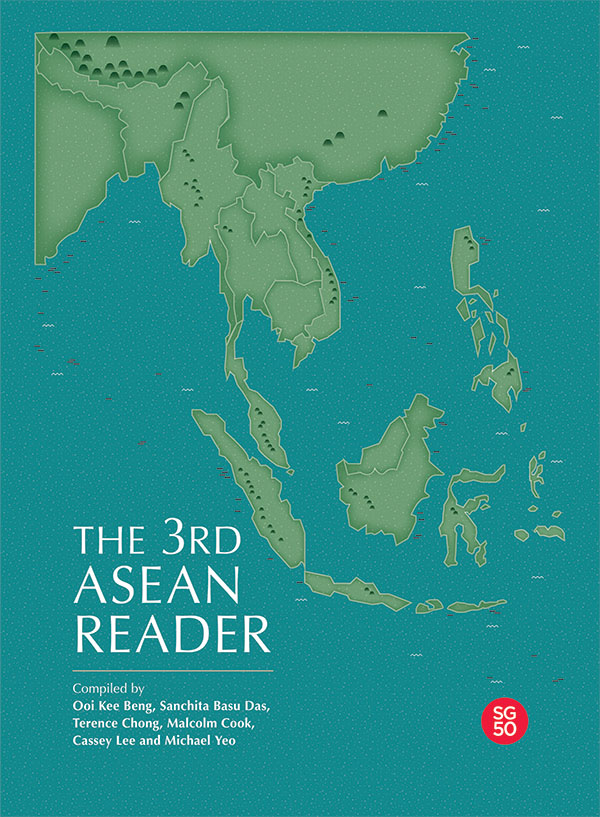Book contents
- Frontmatter
- Contents
- Preface
- Forewords to the First and Second ASEAN Reader: ASEAN: Conception and Evolution
- Forewords to the First and Second ASEAN Reader: ASEAN: The Way Ahead
- Forewords to the First and Second ASEAN Reader: New Challenges for ASEAN
- SECTION I ASEAN: THE LONG VIEW
- SECTION II COUNTRY ANALYSES
- SECTION III COMPARATIVE ANALYSES OF THE REGION
- Southeast Asian Societies
- The Southeast Asian Economy
- Southeast Asian Politics
- SECTION IV INTERNATIONAL DEVELOPMENTS
- SECTION V INSTITUTIONS OF ASEAN
- SECTION VI ASSESSING ASEAN'S INTERNAL POLICIES
- ASEAN Political Security Community
- ASEAN Economic Community
- ASEAN Socio-Cultural Community
- SECTION VII ASSESSING ASEAN'S EXTERNAL INITIATIVES
- ASEAN Processes
- ASEAN's Major Power Relations
- 71 ASEAN's Adventures
- 72 Developing an Enduring Strategy for ASEAN
- 73 Non-Traditional Security in China-ASEAN Cooperation: The Institutionalization of Regional Security Cooperation and the Evolution of East Asian Regionalism
- 74 China-ASEAN FTA Changes ASEAN's Perspective on China
- 75 Japan's Trade Policy with Asia
- 76 Managing Integration in East Asia: Behind Border Issues in Japan-ASEAN Trade Agreements
- 77 Fortifying the Japan-ASEAN Strategic Partnership: Abe's Quest for Viable Hedging Policies
- 78 Prospects for Korean-Southeast Asian Relations
- 79 China's Two Silk Roads: Implications for Southeast Asia
- SECTION VIII SOUTHEAST ASIA: PERIPHERAL NO MORE
- Bibliography
- The Contributors
- The Compilers
77 - Fortifying the Japan-ASEAN Strategic Partnership: Abe's Quest for Viable Hedging Policies
from ASEAN's Major Power Relations
Published online by Cambridge University Press: 22 June 2017
- Frontmatter
- Contents
- Preface
- Forewords to the First and Second ASEAN Reader: ASEAN: Conception and Evolution
- Forewords to the First and Second ASEAN Reader: ASEAN: The Way Ahead
- Forewords to the First and Second ASEAN Reader: New Challenges for ASEAN
- SECTION I ASEAN: THE LONG VIEW
- SECTION II COUNTRY ANALYSES
- SECTION III COMPARATIVE ANALYSES OF THE REGION
- Southeast Asian Societies
- The Southeast Asian Economy
- Southeast Asian Politics
- SECTION IV INTERNATIONAL DEVELOPMENTS
- SECTION V INSTITUTIONS OF ASEAN
- SECTION VI ASSESSING ASEAN'S INTERNAL POLICIES
- ASEAN Political Security Community
- ASEAN Economic Community
- ASEAN Socio-Cultural Community
- SECTION VII ASSESSING ASEAN'S EXTERNAL INITIATIVES
- ASEAN Processes
- ASEAN's Major Power Relations
- 71 ASEAN's Adventures
- 72 Developing an Enduring Strategy for ASEAN
- 73 Non-Traditional Security in China-ASEAN Cooperation: The Institutionalization of Regional Security Cooperation and the Evolution of East Asian Regionalism
- 74 China-ASEAN FTA Changes ASEAN's Perspective on China
- 75 Japan's Trade Policy with Asia
- 76 Managing Integration in East Asia: Behind Border Issues in Japan-ASEAN Trade Agreements
- 77 Fortifying the Japan-ASEAN Strategic Partnership: Abe's Quest for Viable Hedging Policies
- 78 Prospects for Korean-Southeast Asian Relations
- 79 China's Two Silk Roads: Implications for Southeast Asia
- SECTION VIII SOUTHEAST ASIA: PERIPHERAL NO MORE
- Bibliography
- The Contributors
- The Compilers
Summary
INTRODUCTION
ASEAN has maintained close dialogue with Japan ever since 1973. At a special summit held in Tokyo in 2003 to celebrate the 30th anniversary, it was decided that the relationship between the two be elevated into a strategic partnership (Sudo 2015). It was the fast-changing environment in Asia, especially the rise of China, which necessitated the reappraisal of the regional structure and mode of interaction. Specifically, ASEAN-Japan relations have come to be seen in a common strategic perspective ever since the East Asia Summit (EAS) was established in 2005.
FORTIFYING THE STRATEGIC PARTNERSHIP
The year 2011 was regarded as a critical juncture by both Japan and ASEAN (Shiraishi 2014). To begin with, the Japan-ASEAN Foreign Ministers’ Meeting was held on 26 July 2011 in Bali, Indonesia. Both parties agreed with the planned new joint declaration and plan of action that was to be adopted at the next Japan-ASEAN summit meeting, which was to be held in November 2011. The ASEAN-Japan strategic partnership covers vast areas of cooperation. It is encapsulated in the ASEAN-Japan joint declaration for “enhancing strategic partnership for prospering together” and detailed further in the “Plan of Action 2011–2015”. Both were newly issued at the 14th ASEAN-Japan Summit in Bali. It is also built upon the progress of cooperative activities undertaken to date and in consideration of circumstances prevailing in the region since the preceding declaration was issued in 2003. At this summit, Prime Minister Noda Yoshihiko stressed that Japan would provide 2 trillion yen worth of aid for development projects to strengthen regional integration, officials said. Noda also expressed his commitment to boosting cooperation with the region over maritime security and safety amid China's increasing assertiveness at sea.
In a joint declaration issued afterward, Japan and ASEAN mapped out five strategies for promoting peace, stability and prosperity in the region which include deepening political and security ties, cooperation in ASEAN community-building and improving links between ASEAN and Japan. They are: (1) strengthening political-security cooperation in the region; (2) intensifying cooperation towards ASEAN community building; (3) enhancing ASEAN-Japan connectivity; (4) creating together a more disaster-resilient society; and (5) addressing together common regional and global challenges.
- Type
- Chapter
- Information
- The 3rd ASEAN Reader , pp. 397 - 400Publisher: ISEAS–Yusof Ishak InstitutePrint publication year: 2015



